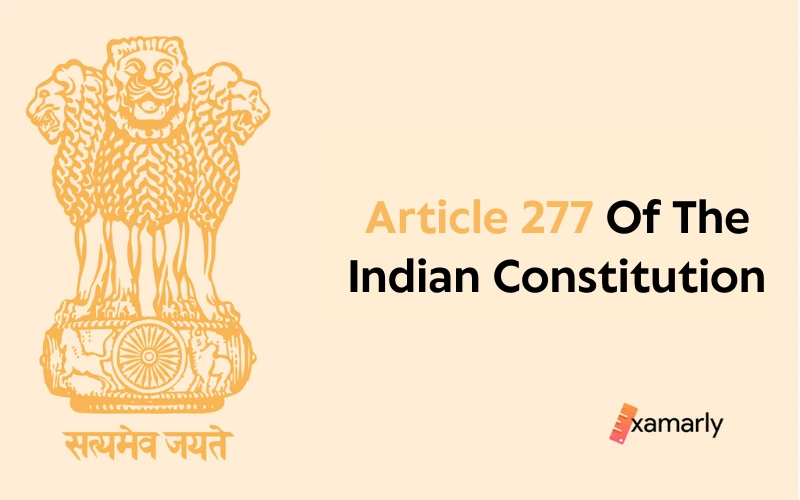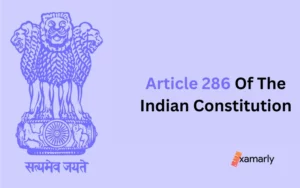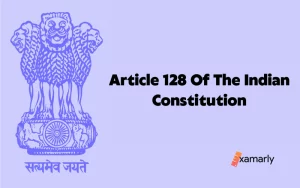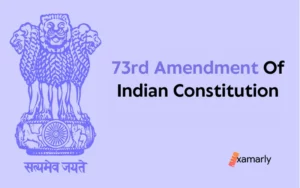An Overview
Welcome to our blog on Article 277 of the Indian Constitution. This article is a crucial aspect of the Indian Constitution as it aims to ensure smooth transition of taxes and finances after the Constitution comes into effect. It is an important provision that prevents conflicts or disruptions in taxes or finances caused by changes in the Constitution of India.
In this blog, we will delve deeper into the power and scope of Article 277 of the Indian Constitution, and explore its background, court cases, and how the provision of the article applies to the distribution of taxation powers between the State government and the Union government.
We will also explain the provision contained in Article 277 that allows for the continuation of taxes, duties, fees or charges that were being used by a State government or a local government before the Indian Constitution was put into effect, and how it continues until the Parliament makes a new law to change it.
Join along to unravel the complexities of Article 277 of the Indian Constitution and its impact on taxes and finances of local government and authorities.
- An Overview
- Article 277 Of The Indian Constitution: Provisions Related To Savings
- Background Of Article 277 Of The Indian Constitution
- Explanation Of Article 277 Of The Indian Constitution
- Court Cases Related To Article 277 Of The Indian Constitution
- Amravati Municipality v. Ramchandra
- Hyderabad Chemical and Pharmaceutical Works Ltd. V. State of Andhra Pradesh
- Summing Up
- FAQs Related To Article 277 Of The Indian Constitution
- What Is The Union List?
- What Is The Purpose Of Article 277 Of The Indian Constitution?
- What Types Of Taxes Can Continue To Be Levied Under Article 277 Of The Indian Constitution?
- Can The Union Government Override The Taxes Being Levied Under Article 277 Of The Indian Constitution?
- Is There Any Cutoff Date For The Continuation Of Taxes Under Article 277 Of The Indian Constitution?
Article 277 Of The Indian Constitution: Provisions Related To Savings
The Constitution of India contains Article 277 of the Indian Constitution. The provision held in the article reads as follows:
277. Savings.—Any taxes, duties, cesses or fees which, immediately before the commencement of this Constitution, were being lawfully levied by the Government of any State or by any municipality or other local authority or body for the purposes of the State, municipality, district or other local area may, notwithstanding that those taxes, duties, cesses or fees are mentioned in the Union List, continue to be levied and to be applied to the same purposes until provision to the contrary is made by Parliament by law.
The main goal of Article 277 of the Indian Constitution is to make sure that there will be no problems or confusion in the taxes or finances of local government and authorities when the Constitution is put into effect. It aims to prevent conflicts or disruptions in taxes or finances caused by the changes in the Indian Constitution.
In simple words, it is a provision to ensure smooth transition of taxes and finances after the Constitution comes into effect.
The power of Article 277 is very narrow and it can only be used in specific situations. It can only be used when there has been a change in the way taxes are divided between the State government and the Union government. It cannot be used in situations where there has been no change in the distribution of taxation powers.
In other words, it has a very specific use case and cannot be applied in all cases where there is no change in the distribution of taxation powers.
Background Of Article 277 Of The Indian Constitution
Let us now take a brief look at the background of Article 277 of the Indian Constitution.
- The Article 277 of the Indian Constitution was formulated from Draft Article 257.
- It was introduced in the Constituent Assembly for discussion on August 9, 1949.
- The Article said that the taxes that were being used by a State government or a local government before the Indian constitution was put into effect could still be used in the same way until the Parliament made a new law.
- The Chairman of the Drafting Committee proposed a modification. He suggested the addition of the phrase “by law” to the very end of the article. This change was approved without any discussion being included.
- The Draft Article was added to the Constitution of India on the same day, that is August 9, 1949.
Explanation Of Article 277 Of The Indian Constitution
The provision contained in Article 277 of the Indian Constitution states that the taxes, duties, fees or charges that were being used by a State government or a local government before the Indian constitution was put into effect can continue to be used in the same way they were being used before. Even if those taxes, duties, fees or charges are listed in the Union list, they can still be used by the State or local government until the Parliament makes a law that says otherwise.
In simple words, Article 277 allows for the continuation of taxes, duties, cesses, or fees that were being lawfully levied by State governments, municipalities, or other local authorities before the Constitution came into effect, and it will continue until the Parliament makes a new law to change it.
Court Cases Related To Article 277 Of The Indian Constitution
There are two prominent court cases that revolve around the provisions provided by Article 277 of the Indian Constitution. We will now discuss them one by one.
Amravati Municipality v. Ramchandra
- The municipality of Amravati had a rule in place before the Indian Constitution went into effect that allowed them to charge a tax on goods, except for gold and silver, that were brought into or taken out of the city by train or road.
- After the Constitution was put into effect, the power to charge this type of tax was given to the Parliament under a specific section of the Constitution, that is, Entry 89 of List I.
- In 1959, the municipality changed the rule and started to charge the tax on gold and silver as well. The court ruled that the city was not allowed to do this because the Article 277 of the Indian Constitution did not allow for the tax to be increased or changed in any way.
- In other words, the municipality of Amravati had a law that allowed them to charge tax on goods except for gold and silver, but after the Constitution came into effect, the power to charge this tax shifted to the Parliament and the court ruled that the city was not allowed to change the law and charge the tax on gold and silver as well.
- The above-mentioned case highlights the fact that that the taxes, duties or fees that were being used by a State government or a local government before the Indian Constitution was put into effect cannot be altered or increased by any government authority or body. This means that the taxes, duties or fees that were in place before the Constitution came into effect must remain the same, and cannot be changed or increased in any way.
- This is an important provision that ensures that there is continuity and consistency in the tax system, and that the changes in the Constitution do not disrupt the revenue collection of the State or local governments. This provision ensures that the pre-constitution taxes, duties or fees remain the same and are not subject to changes or increases without the approval of the Parliament.
Hyderabad Chemical and Pharmaceutical Works Ltd. V. State of Andhra Pradesh
- The Pharmaceutical company that was making the medicines had to use alcohol and were working under licenses given by the State government in Hyderabad. They had to pay certain fees to the State government for oversight as per the rules of the Hyderabad Abkari Act.
- Later, the Parliament passed a new law called the Medicinal and Toilet Preparations Act, 1955 which did not require them to pay the fees.
- The State government’s right to charge the fees after the new Parliament law was passed was challenged.
- The court ruled that according to entry 84 of list 1 and 7th Schedule of the Indian Constitution and Article 277, the State government was not allowed to charge the fee after the Parliamentary law was passed. It was also held that the new law passed by the Parliament repealed the Hyderabad Act.
- In other words, the people who were making medicines had to pay fees to the State government, but later the Parliament passed a new law which removed the need of paying those fees, the court ruled that the State government has no power to charge the fee after the new law was passed and the new law repealed the previous State law.
The above case is an example of Pre-Constitution tax. Pre-constitutional taxes or fees refer to taxes, duties, fees or charges that were being used by a State or a local government before the Indian Constitution was put into effect. These taxes or fees can continue to be used in the same way they were being used before, even if they are listed in the Union list.
However, this continuation is temporary and is subject to the action of the Parliament. The Parliament has the power to make a new law that changes the continuation of these pre-constitutional taxes or fees. This means that if the Parliament makes a law to the contrary, it can change the way these taxes or fees are being used or even abolish them altogether. Therefore, pre-constitutional taxes or fees can only be used only under specific circumstances. These can be levied until the Parliament makes a law to the contrary.
You Might Also Like:
| Article 271 Of The Indian Constitution | Article 272 Of The Indian Constitution |
| Article 273 Of The Indian Constitution | Article 274 Of The Indian Constitution |
Summing Up
After delving into the details of Article 277, we can come to the following conclusions:
- Article 277 of the Indian Constitution is a provision that ensures smooth transition of taxes and finances after the Constitution comes into effect. It aims to prevent conflicts or disruptions in taxes or finances caused by changes in the Constitution.
- The power of Article 277 is very narrow and can only be used in specific situations, such as when there has been a change in the way taxes are divided between the State government and the Union government.
- The provision in Article 277 states that taxes, duties, fees or charges that were being used by a State or a local government before the Indian Constitution was put into effect can continue to be used in the same way until the Parliament makes a law that says otherwise.
FAQs Related To Article 277 Of The Indian Constitution
What Is The Union List?
The Union List of India is a list of items on which the Union government has exclusive power to legislate and impose taxes. The Union List is included in the Seventh Schedule of the Indian Constitution and is comprised of 97 items. These items include subjects such as defense, foreign affairs, currency, atomic energy, and communications. The Union government also has the power to legislate and impose taxes on any other matter not included in the State List or Concurrent List, as well as any matter that is referred to it by the President of India.
The Union List is one of three lists in the Indian Constitution’s Seventh Schedule, the other two being the State List and the Concurrent List. The State List contains items on which the State governments have exclusive power to legislate and impose taxes, while the Concurrent List contains items on which both the Union and State governments have the power to legislate and impose taxes.
What Is The Purpose Of Article 277 Of The Indian Constitution?
Article 277 of the Indian Constitution deals with the taxation powers of the Union and State governments. It allows for the continuation of taxes, duties, cesses, or fees that were being lawfully levied by State governments, municipalities, or other local authorities before the commencement of the Constitution.
What Types Of Taxes Can Continue To Be Levied Under Article 277 Of The Indian Constitution?
Any taxes, duties, cesses, or fees that were being lawfully levied by the Government of any State, municipality, or other local authority or body for the purposes of the State, municipality, district, or other local area may continue to be levied and applied to the same purposes under Article 277 of the Indian Constitution.
Can The Union Government Override The Taxes Being Levied Under Article 277 Of The Indian Constitution?
Yes, provision to the contrary can be made by the Parliament by law, which would override the taxes, duties, cesses, or fees being levied by State governments, municipalities, or other local authorities under Article 277 of the Indian Constitution.
Is There Any Cutoff Date For The Continuation Of Taxes Under Article 277 Of The Indian Constitution?
No, there is no cutoff date mentioned in the article for the continuation of taxes, duties, cesses, or fees under Article 277 of the Indian Constitution. It continues until provision to the contrary is made by the Parliament by law.






